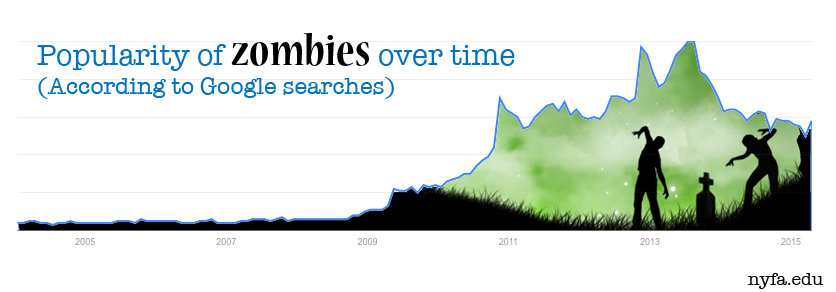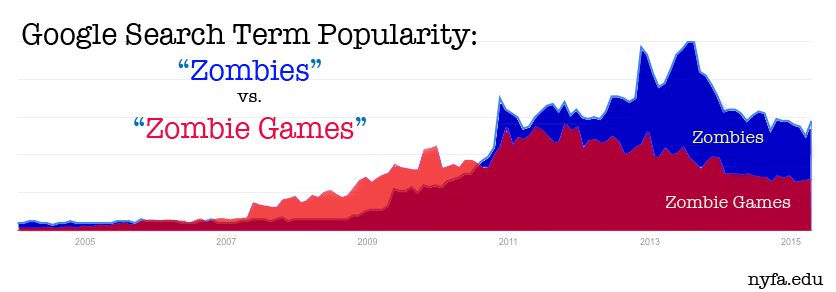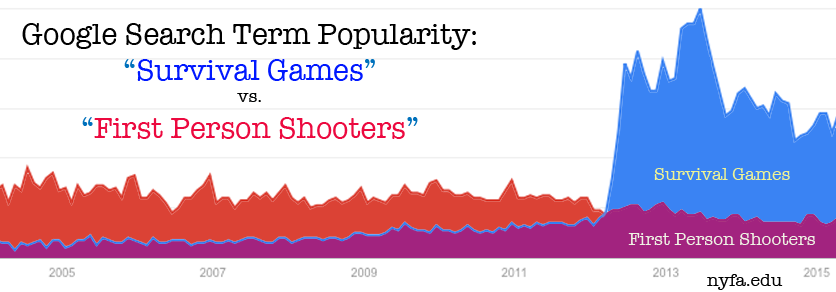Zombies.
Zombies, zombies, zombies.
For the past decade, the undead blighters have been rising from their graves and spreading their viral appeal through pretty much every medium and genre they can get their rotten hands on.
Cinema, TV, art, graphic novels, video gaming, books; you name it, and someone has tried to insert some zombie action into it albeit with varying levels of success (even classic romance literature got infected with the 2009 parody novel Pride and Prejudice and Zombies).
But even in the wake of the World War Z movie adaptation and the highly acclaimed Walking Dead show, it seems that the momentum is finally slowing to a shamble…
… at least if Google search trends are anything to go by.
Google Trends: Popularity of Zombies on the Decline

Looking back over the last decade, we can see that the number of people Googling the simple search term ‘zombies’ started off at a fairly even pace before starting to climb around late 2008. Incidentally, this is the point at which Max Brook’s great book World War Z started to go global, and the release of the aforementioned Pride and Prejudice and Zombies may account for the sharp spike you can see in early 2009.
This fascination with all things undead quickly grew, hitting a couple of peaks between 2013 and 2014. Again, neatly tying in with the global release of the movie version of World War Z.
Save for one or two minor attempts to rise from the grave, it’s been declining ever since. The zombie trend isn’t quite un-undead just yet, but it’s certainly heading that way.
So what’s the take home message here? Well, if you’re at game design school working on what you’re sure is going to be the next big zombie apocalypse game, you might want to reconsider your options because tastes in video games strongly mirror the wider consensus.
Are We Bored of Zombie Games?
 As we can see from the above chart, interest in zombie games follows the same pattern as interest in zombies in general, but is actually shifted to the left – it got started a lot earlier, and also hit its peak a couple years sooner. Either way, the outcome is the same.
As we can see from the above chart, interest in zombie games follows the same pattern as interest in zombies in general, but is actually shifted to the left – it got started a lot earlier, and also hit its peak a couple years sooner. Either way, the outcome is the same.
But let’s not throw the baby out with the bathwater here. Zombies may be going out of vogue, but the elements that made us fall in love with them the first place are on the rise.
Survival Horror Games More Popular Than First Person Shooters

In a strange twist of fate, first person shooters, which have been a mainstay genre of the video game industry for decades, have been dethroned by a newly rising star.
Survival horror is really coming into its own of late, particularly in the multiplayer sphere. Games like Rust, 7 Days to Die and DayZ have each sold millions of copies despite none of them having gone to full release as of yet.
Single-player survival horror titles are also doing well in the current market. Arguably, the award-winning and utterly terrifying Amnesia: The Dark Descent kicked things off in 2011 (right before the major peak), and more recent titles like Alien: Isolation are carrying on the trend.
Of course, there’s no reason why zombies can’t be the antagonist in the survival horror environment (DayZ being an example) but for the most part, the genre is around crafting and picking your battles wisely.
Also worth noting, as a relatively new genre, there’s also plenty of room for innovation in survival horror games. So, game design school students have plenty of new ground on which to create…
… but at this stage, the same can’t be said for zombies.
* N.B: Above graphs do not represent absolute search volume, but search interest relative to the highest point on the chart. It sounds like an odd way of doing it, but it’s a better way of focusing on patterns and makes comparative graphs like the ones above a lot clearer. More details here if statistical normalization floats your boat.
